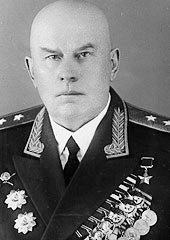Anton Ivanovich Lopatin
Anton Ivanovich Lopatin ( Russian Антон Иванович Лопатин , born January 6, jul. / 18th January 1897 greg. In the village of Kamenka, today Rajon Brest , Belarus ; † 9. April 1965 in Moscow ) was a Soviet lieutenant general (1942) and was in world war II as a hero of the Soviet Union awarded.
Life
Military career
Coming from a peasant family, he was drafted into the Tsarist army during the First World War in 1916 and deployed on the Southwest Front. In the Russian Civil War he joined the Red Army in 1919 and also became a member of the Communist Party . He fought since November 1919 in the Association of the 1st Red Cavalry Army against the White Guards under Denikin and Wrangel . With the 21st Cavalry Regiment of the 4th Cavalry Division, he fought against Poland on the Western Front in 1920. In 1927 he completed a commander's course at the cavalry school in Leningrad, after which he was deputy commander of the 21st Cavalry Regiment. In December 1930 he took over the management of the military and economic supply of the 4th Cavalry Division. In November 1931 he commanded the 39th and from December 1936 the 32nd cavalry regiment, in July 1937 he was commander of the 6th Cavalry Division. On February 17, 1938, he was promoted to colonel . From September 1938 he taught tactics at the cavalry school and until July 1939 he served as a cavalry inspector in the Transbaikalia Military District . On June 4, 1940 he received the rank of major general and took over command of the 15th Army on the Far East Front as a deputy. After returning to Europe, on November 15, 1940, he was appointed commander of the 31st Rifle Corps of the Kiev Special Military District.
In the German-Soviet War
At the beginning of the Great Patriotic War , his 31st Rifle Corps was part of the 5th Army on the Southwest Front in the Lutsk area . In September 1941 he took part in the Battle of Kiev . On August 20 he was given command of the 6th Rifle Corps and at the end of October 1941 he took command of the second formation of the 37th Army on the southern front . At the beginning of December, his army, together with the 9th Army, counterattacked the flank of the German 1st Panzer Army to retake Rostov-on-Don . On March 27, 1942, he was appointed lieutenant general. From June 24th to July 14th, 1942 he commanded the 9th Army on the Southwest Front , which tried in vain to contain the German advance on the Donbogen. On August 3, 1942, he took command of the 62nd Army on the Don , which opposed the German 6th Army to protect Stalingrad and was defeated in the Kalatsch Kessel Battle . From October 14, 1942 to March 10, 1943 he commanded first the 34th Army on the Northwest Front , then the 11th Army until July 14th and took part in the offensive at Staraya Russa . On September 25, 1943 he took over the leadership of the 20th Army on the Kalinin Front for a month . Since January 1944 deputy commander of the 43 Army called, he took the first Baltic Front on the Bagration operation part. On July 22, 1944, at his personal request, he was given command of the 13th Guards Rifle Corps, which in his career so far was tantamount to relegation.
In autumn 1944 he took part in the 3rd Belarusian Front in the liberation of the Baltic States and in January 1945 in the Battle of East Prussia . In April 1945 his troops took part in the assault on Königsberg , then fought the south coast of the Samland peninsula free and occupied Groß Heydekrug and Zimmerbude . On April 19, 1945 he was awarded the title Hero of the Soviet Union .
In July 1945 he became the commandant of the separate 2nd Rifle Corps on the Transbaikal Front . On August 9, advancing across the Argun to attack, his two divisions crossed the Khairchan, covered 180 kilometers in four days and made contact with parts of the 36th Army. In the Yakeshi area, he cut off the escape route for the Japanese and took 6,000 prisoners.
post war period
After the war, he completed higher courses at the Voroshilov Military Academy in 1946, after which he commanded the 7th Guard Army in the Transcaucasus military district . In April 1947 he became commander of the 13th Rifle Corps and in September 1947 he became deputy commander in the Transcaucasus. In July 1949 he became the commander of the 9th Guards Rifle Corps in the military district of Belarus . In January 1954 he retired from active service due to illness. He died in Moscow in 1965 and was buried in the Novodevichy Cemetery.
Lopatin was three times the Order of Lenin , three times with the Red Banner , twice with the Order of Kutuzov was awarded the first class and the Order of the Red Star and other medals.
Web links
- Антон Иванович Лопатин on encyclopedia.mil.ru
| personal data | |
|---|---|
| SURNAME | Lopatin, Anton Ivanovich |
| ALTERNATIVE NAMES | Лопатин, Антон Иванович (Russian) |
| BRIEF DESCRIPTION | soviet lieutenant general |
| DATE OF BIRTH | January 18, 1897 |
| PLACE OF BIRTH | Kamenka, Russian Empire |
| DATE OF DEATH | April 9, 1965 |
| Place of death | Moscow |
